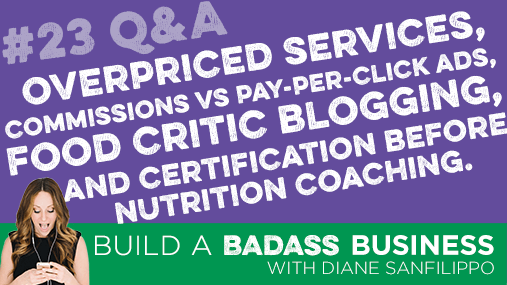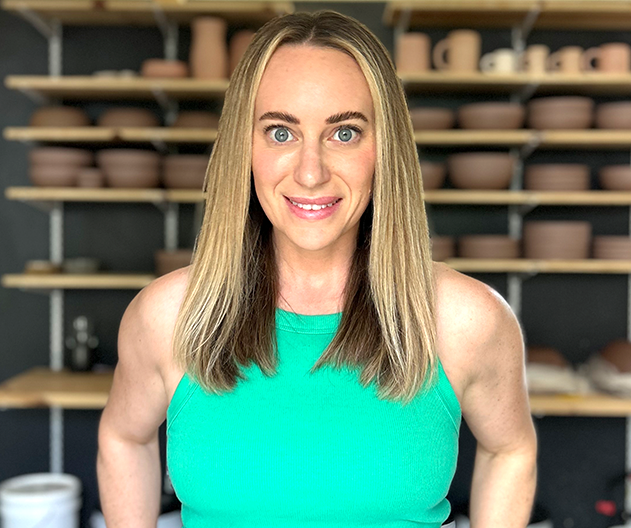
Build a Badass Business Podcast #23: Q&A: Overpriced services, commissions vs pay-per-click ads, food critic blogging, and certifications before nutrition coaching
 In this episode, I answer questions about pricing your services (and what to do when other think they’re overpriced), options for earning money from ads on your website, how to start blogging as a food critic, and thoughts on getting certified before you start coaching people on nutrition.
In this episode, I answer questions about pricing your services (and what to do when other think they’re overpriced), options for earning money from ads on your website, how to start blogging as a food critic, and thoughts on getting certified before you start coaching people on nutrition.
Join the FaceBook group to get in on the conversation : Facebook, Build a Badass Business
And come follow me on Periscope! I’ve been posting videos often, and would love for you to hop on and interact with me, LIVE! Download the free Periscope app, then find me by searching “Diane Sanfilippo.” Replays available after at : Katch.Me
Don’t miss an episode!
Subscribe to Build a Badass Business on iTunes.
And don’t forget to leave a review once you’ve been listening!
Get your questions answered:
Fill out this quick form to submit a question to the show.
![]()
Build a Badass Business: Episode # 23: Overpriced services, commissions vs pay-per-click ads, food critic blogging, and certifications before nutrition coaching
Coming to you straight from her basement home office in suburban New Jersey, this is Build a Badass Business with Diane Sanfilippo. Diane is a New York Times bestselling author and serial entrepreneur. She’s here to teach you how to grow and develop a successful business you love, and how to create raving fans along the way. Here she is, your host: Diane Sanfilippo.
Dr. Scott Mills: Drew asks; “I know you recently talked about affiliate programs, but I was wondering If you had experience with commission and pay per click programs, and what your take on each was?”
Diane Sanfilippo: Hey Drew, good questions. I did talk about affiliate programs; and I actually do not have experience with pay per click programs running from my website, which is what I’m assuming you mean. I do have experience with a commissioned form of an affiliate program, so what I’m assuming what you’re asking about here is, if you have an ad on your website on your blog on the sidebar, etc., and an advertiser or company wants to pay you per click your getting, not necessarily per sale.
So I’m just going to throw this out there; again, I don’t have anything pay per click on my website. I have no problem with that, I think it’s a great way to go. It’s definitely going to be potentially easier in terms of, you’ll get more clicks than you will sales. However, the rate that you’ll get per click is obviously going to be way, way lower than what you would get per sale that you might make to earn a percentage of whatever that sale is.
I personally like to keep what I’m promoting more to a minimum. I would like to promote things that the people I am promoting them to would like to buy. So, at this stage, I’m most comfortable only with having affiliate programs or affiliate items commission based where, you know, I’m getting a percentage of the sale, it doesn’t cost the customer anything more to make that purchase but I’m getting a cut, or you’d be getting a cut for making that connection and letting that customer find that product or service that it is you’re recommending.
In terms of traffic levels; again, this area, ads on a website, it’s not my area of expertise. It’s not something that I’ve done, and I would recommend you track down –somebody who is a little bit more of an expert on ads on a website versus something like links for an affiliate program. Just wanted to get to this question even though I don’t have the best answers for you, but I wanted to let you know that I saw it and I’m addressing it, so thank you Drew for submitting that.
Dr. Scott Mills: Heidi says; “My husband thinks I should start a food critic blog, as I am opinionated about food at restaurants. He finds the way I complain about the poor quality and taste of some foods humorous. I feel like if I did start a blog about this, it would just come off as complaining and negative. What do you think?’
Diane Sanfilippo: Alright, Heidi, my honest take on this is that you’d have to get it started pretty soon, and you’d have to be writing on it very regularly. And quite frankly, I think the only way to make money doing that, this is just what I see at this stage, kind of my instinct, is you’d have to be really, really, really witty, and really, really, really funny. Because a lot of the places you’re going to go to eat, most of the people reading the website can’t relate. So if you’re going to restaurants that are not all national chains, and you’re going to local mom and pop place, people reading it aren’t going to have anything to think or say about the food itself. So they’re really going to need to be entertained, and what you’re doing with your reviews, you can be absolutely honest and you would have to be pretty freaking hilarious. And if you get a ton of traffic to that website, you’ll be able to place ads, as I was just kind of alluding to in the previous answer to the previous question, or have affiliate programs for things that you recommend.
Perhaps there’s some kind of guide to restaurants that you think has it down pretty well, or maybe there’s some other website that you want to link to, like Yelp. I don’t know if Yelp would advertise with you to help send people to their website, or Open Table, etc. One of those. But that’s kind of the gist of it.
Now another thing you could easily do is offer up something on your website that mixes things up a little bit. So maybe you have these rants and raves blog posts, where you do your hilarious restaurant reviews, and maybe you do also mix it up with some food blogging. I’ll tell you what, sharing recipes is probably going to help you get more traction in the beginning until people kind of, you know, you build a rapport and people know that you’re funny, and when they see your articles they’re desperate to read it. Until that happens, I think having some serious recipes. Or maybe you try and recreate something and you’re hilarious about it.
Again, you really have to create something that people will find entertaining or they’ll really get value from, and simply being a critic isn’t that helpful, again, unless you’re specifically getting paid for it or unless you really carve out a niche for yourself in a specific marketplace. And if you think that that’s possible, I don’t know if you live in a major metropolitan area, if there’s any; and you have to really think, who’s going to pay me to say these things about a restaurant. And it’s obviously not going to be the restaurants. Again, it might be a website like Yelp, or Open Table, or one of these other review sites, but they may be unwilling to do it, as well. They might be worried that you’re a loose cannon and they don’t know what you’re going to say about a restaurant who’s advertising with them. So I would keep all of that in mind.
Dr. Scott Mills: Angelique says, “I had one of those moments where all of a sudden, I’m questioning the prices that I have put into place for my corporate packages. Of course, I began to feel this after I was told how expensive it was, and that it was all about the money. When I discussed how the breakdown per person showed a clear value, they weren’t impressed. Am I crazy for charging what I do?”
Diane Sanfilippo: Angelique, quite frankly, if the price that you have for your services is what you feel they are worth, and what you feel a company needs to be willing to pay for you to show up and give the talk that you’re going to give, and this is it, then this is it. That’s the price. And if they want somebody who’s less expensive, then they can hire somebody who is less expensive. They’re going to probably have less experience and not be as qualified as you are, and that’s ok.
So two things here; one you have to either be willing to say, ok, walk away, you don’t want to pay the price, this is the price and that’s it. Or, the second thing is, if you really want a corporate consulting job, and you want that under your belt for experience, for testimonials, for just getting that time to do it. Again, the experience. If that’s what you want, and they’re not going to do it and they’re balking at the prices, then perhaps you lower the prices and you say, you know what, because I really want to do this with you guys, this is my normal price, I’m willing to do it at this rate and moving forward, again, if you guys are going to refer me to somebody else that you know, if you’re going to tell someone else, these are my normal prices.
I don’t generally recommend that people give discounts, but this is the place where you have to make a judgment call. I’ve definitely done it before where I’ve said to maybe a friend or maybe a new client, when I was newer and doing consulting and I would say, look, my regular rate is $85 and hour, I’m going, this is when I was first doing nutrition consulting. I’m going to do this with you at $65 an hour because I really want to help you, and I’m at a place where I’d love to take you on an as a client. I know this is a hardship for you, etc., and maybe I would bend the rules a little bit there. But again, that’s something that I would only do in the beginning if it’s experience that you want.
Essentially, this is a situation where, if you have something they want, end of story, and you’re sort of, not that you’re indifferent to teaching the people the information, of course you want to teach them. But if you’re sort of indifferent to the experience, if you’re like, whatever, I can take it or leave it, I’ve done this before, I do it all the time, etc., you’re prices are your prices. If they have something you want; if they have the ability to give you this experience, then that’s where you have to work on negotiating.
This is kind of the same scenario as buying a car, buying a house, whatever. I {laughs} we went to buy a car last year, and you know, look, they had what I wanted, but I’m still a tough sale. I still said, you know what, here’s the price that I want to pay, take it or leave it. And I knew they wanted to sell me the car. In your case, they could say, here’s what we’re willing to pay, take it or leave it. And if they know you really want that experience, then that’s it. The ball’s in your court. You make that decision.
So that’s really all it is. I wouldn’t worry too much about it, but I would make your decision, and if your heart you feel like you know what, maybe they’re right, maybe I’m over pricing it right now, take it down. Take the job, do the work, see how you feel. You might feel after that that you’re like, that was the wrong decision, I should never have lowered my prices; and guess what? You’ll never do it again. If you decide, you know what, I’m going to keep my prices where they are, they may say, alright, you know what, we’re going to go with you because they don’t want to spend the time to find somebody else who is going to be cheaper, or maybe after a little bit of time getting to know you they just decide, you know what, we like her, we’re going to pay her, and that’s the end of the story.
Dr. Scott Mills: Rebecca asks, “What service do you use to transcribe your podcasts? Or do you have a real person do it?”
Diane Sanfilippo: Well that’s a quick one, Rebecca. We have a real person on our team, her name is Amanda, she lives in Texas, and because I have my main podcast Balanced Bites podcast has a lot of jargon, health and nutrition jargon and lingo and different words and abbreviations and all that good stuff, I did not want to outsource that to an overseas person, but I know a lot of people who do that kind of thing where they hire someone who is overseas to transcribe it. There are probably services that would do it, as well, but I prefer to hire somebody that I can meet face to face at least once a year.
Dr. Scott Mills: Last up, Amber asks, “I have zero nutrition certifications. Do I need these before I start my business? And how do you get out of a rut and move forward? I feel like I’m starting and stopping too often. Love your show and the wealth of knowledge you’re sharing, it still blows my mind! Thank you Diane!”
Diane Sanfilippo: Amber, I would say that you need to at least get started on a certification before you start your business, but you can do that in parallel, in tandem. You can get some business paperwork going. You will most likely be a sole proprietor from the very beginning, but you can talk to an accountant about this or a book keeper or anybody who can consult. Generally it’s going to be an accountant, but what you can do while you’re going to school and while you’re just getting starting in those very first classes, I’m sure you’ll have, at least if it’s an online program you’ll have some kind of mentor or somebody you can talk to about this.
But, you can start offering some really basic stuff; having some neighbors come over and teach them some cooking classes. Maybe you can take a friend or a neighbor or a colleague, or somebody who wants to learn about better, healthier nutrition. Take them to the grocery store and help them buy better food. You can absolutely work with just showing people different things to buy or different ways to cook things before you start ever talking about food relating to health.
As crazy as it sounds, once you start talking about the way food can change your health, and you do tend to start to get into some of that clinical territory that you need to make sure that by state and by your certification that you’re speaking properly about it. However, if you are simply showing someone a brand that you like in the store and why you like it; oh, it doesn’t have sugar, whatever you want to say, then that’s a really good place to start.
Now, your second question, how do you get out of a rut and move forward; I made a short video about this. Go to http://katch.me/balancedbites and you can see there is exactly a question called that, I believe, it’s how do you get out of a rut. Oh, no, I called it how do you get out of a funk? So check out that video. It will absolutely help you out, and I’m trying to see right now if I have, how to snap out of a funk. We’ll see if we can link to it in the show notes to this episode, and that should help you out immensely.
That’s all I’ve got for you guys today. Don’t forget to subscribe in iTunes so you don’t miss an episode. And drop me a review to let me know what’s speaking to you from the show. If you want to get in on the conversation and you haven’t yet joined the group already on Facebook, head on over there and join the Build a Badass Business group. I share insights and tips regularly, as well as answer your questions right there on the page. Do work that you love, and hustle to make your business grow like your life depends on it, because it does. Thanks for listening, and I’ll catch you on the next episode.
Don’t miss an episode – subscribe here.


